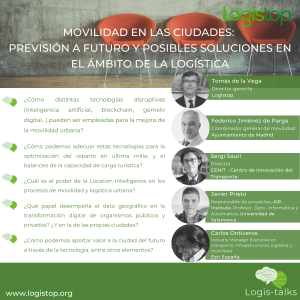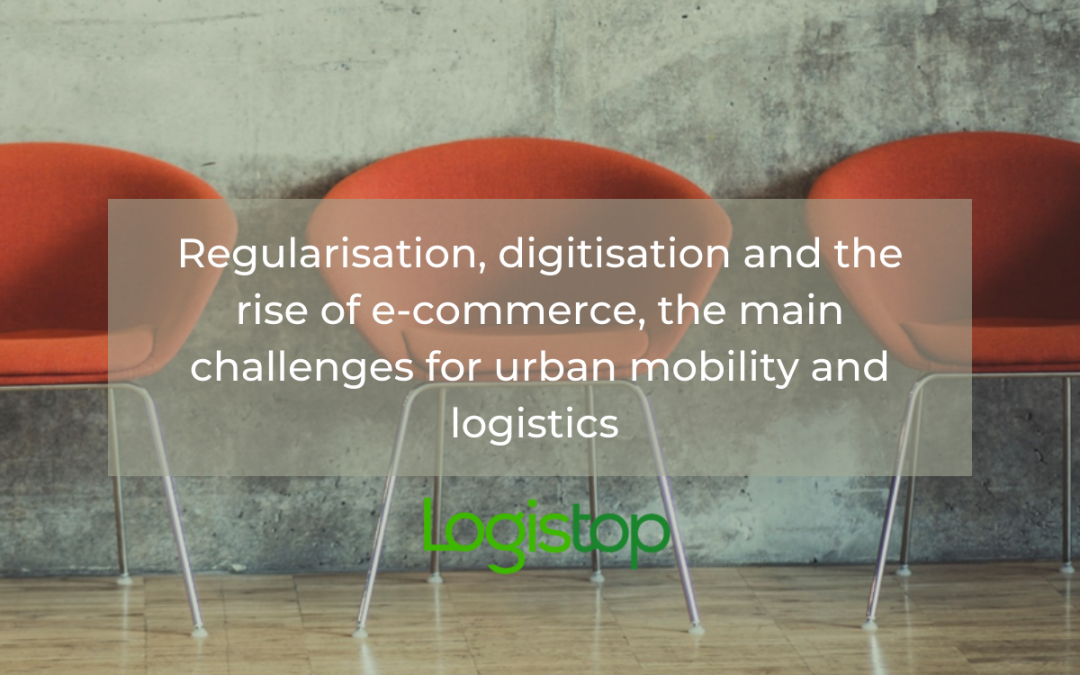- Public-private collaboration is considered essential to address the challenges of the sector with guarantees.
- Technological development and its solutions are advancing faster than their own regularisation.
In Logis-Talks “Mobility in cities: future forecast and possible solutions in the field of logistics“, the current and future challenges of urban distribution of goods have been analysed and debated, which must be addressed collaboratively by the private and public sectors.
To analyse these issues, we had the participation of Federico Jiménez de Parga, General Coordinator of Mobility, Ayuntamiento de Madrid, Sergi Sauri, Director, CENIT – Centro de Innovación del Transporte, Javier Prieto, Project Manager, AIR Institute, y Carlos Ontiveros, Industry Manager Executive in Transport, Infrastructures, Logistics and Mobility, Esri España, s well as the presentation and moderation of Tomás de la Vega, Managing Director, Logistop.

Trends, challenges and solutions in urban goods distribution
Based on the historical problems that urban distribution of goods has to face, Sergi Sauri analysed the main challenges and trends that are occurring in this field. The complexity of the situation, derived from the large number of agents involved with interests that are not always moving in the same direction, hinders the implementation of the digitalisation of the sector, as well as the applicability of the different innovations that are already being worked on.
In terms of regulation, another of the great challenges that the sector must (and will have to) face, Sergi emphasises the fact that all the regulatory measures for more sustainable transport and mobility in cities will be applied continuously and forcefully in Europe, so the sector must adapt to the pace that these regulations are setting and be aware of what is going to be implemented. In this sense, it must be taken into account that the rise of e-commerce is not aligned with sustainable transport and mobility policies, so it is important to seek and implement instruments for its improvement, as well as possible incentives for the actors involved.
Finally, Sergi highlighted the role of operators, who will have to develop delivery strategies based on digitalisation and alternative energies to manage the market-regulation dilemma.
“The dialogue between the various actors involved in the urban distribution of goods, led by the public administration, is complex. Not all companies are prepared for the change that must and will have to be addressed and this, together with regularisation, digitalisation and the rise of e-commerce, is one of the main challenges facing this sector”
Sergi Sauri, Director, CENIT – Centro de Innovación del Transporte
Strategy for the optimisation of the urban distribution of goods in Madrid
For his part, Federico Jiménez de Parga provided the point of view of the public administration with regard to a sector which, as he indicated, has a direct impact on a city such as Madrid and is constantly working on the search for solutions that will allow for the establishment of a sensible organisation of the sector that regulates and improves mobility.
The reorganisation of the sector focused on digitalisation, intelligent loading and unloading systems, the promotion of micro-logistics, as well as the urban distribution of goods at night are some of the lines of work being developed by the Madrid City Council, as Federico explained in his speech.
“We are working on the search for and development of solutions that will allow us to establish a sensible planning of the sector that regulates and improves mobility in Madrid”
Federico Jiménez de Parga, General Coordinator for Mobility, Ayuntamiento de Madrid
Artificial intelligence, blockchain and digital twin for the improvement of urban mobility
Next, Javier Prieto explained how the different technologies that are currently available are being applied in urban mobility, not only in the transport of goods, but also in other issues related to mobility and that can help to improve the transport of goods.
Through three pilot projects that they have developed and are developing, Javier analysed how, through the implementation of technologies such as Deep learning or blockchain, among others, they are working to make cities increasingly intelligent through certain algorithms and, in this way, to achieve, as far as possible, a reduction in consumption, optimise the development of urban freight transport companies and make cities more sustainable.
“The application of technologies such as deep learning or blockchain not only in freight transport but also in other urban mobility issues, in addition to improving freight transport, contributes to making cities increasingly smarter and more sustainable”
Javier Prieto, Project Manager, AIR Institute
The power of Location Intelligence in urban mobility and logistics
Carlos Ontiveros highlighted the importance of location intelligence in urban mobility and logistics, as it can unmask the hidden value of fundamental data in digital transformation and enable an organisation’s growth rate.
We are in a process of digital transformation, it is a complex time, but at the same time a time in which many opportunities are emerging. Therefore, as Carlo points out, the application of the technology and tools we have available, through advanced spatial processes using location intelligence, allows us to respond to different operational needs or traffic problems in real time in the city, among other problems.
“In order to understand and handle the massive amount of data available to us and to be able to make optimal use of location data, we need realistic scenarios. This process model based on the digital twin concept enables the measurement, visualisation, planning and analysis of the situation that will allow us to improve decision making through certain patterns”
Carlos Ontiveros, Industry Manager Executive in transport, infrastructures, logistics and mobility, Esri España
Future forecast and possible solutions in the field of logistics and urban mobility
At the end of the speeches, a round table discussion was held, moderated by Tomás de la Vega, in which different issues related to the present and future of urban mobility and logistics were analysed.
In general terms, it was considered that the main challenges to be faced by the public administration are the articulation of dialogue with the different actors involved in urban logistics, the regularisation of the sector, as well as its digitalisation.
To conclude, given the current situation in which the population is increasingly concentrated in the cities themselves, together with the vertiginous rise of e-commerce, logistics must evolve in parallel in order to meet current needs.
Cohesion between the different existing solutions is fundamental and, to this end, public-private collaboration is considered to be of vital importance, and this is where one of the main challenges that companies, associations and other actors involved face lies.
About Logistop
Logistop is the benchmark workspace for collective innovation through the realisation of projects hand in hand with our members. Transforming the entire supply chain into a more efficient and sustainable one. All this with the aim of articulating and carrying out innovation projects among the members, without excluding the possibility of collaborating with or receiving support from certain organisations outside Logistop.

